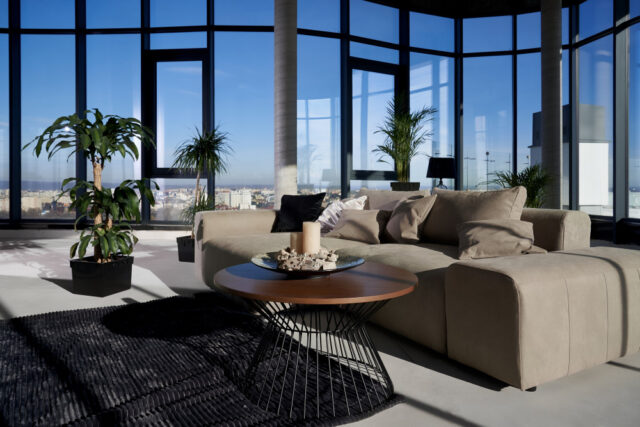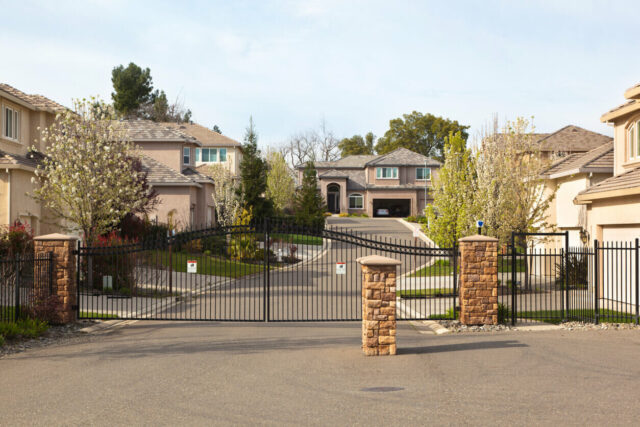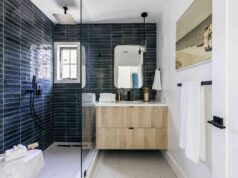
Estate homes refer to extravagant residences on sprawling properties that offer wealthy homeowners privacy, security, and luxury amenities. These experts claim that their expansive layouts, remote locations, and deluxe features provide owners with a refuge from public life. Estate homes enable the upper echelon to retreat into an exclusive world of comfort and leisure.
Characteristics such as acreages of land, long driveways, security gates, state-of-the-art systems, and advanced amenities all contribute to the seclusion and self-containment exclusive to estate homes. Owners can go about their days on premises, enjoying leisure, entertainment, and recreation without leaving home.
The Independence of Gated Properties

The first step in establishing exclusivity for estate homes lies in restricted access roadways leading onto the grounds. Primarily situated in rural areas offering distance from neighbors, estate homes usually involve lengthy driveways that pass through secured gates. These entry gates act as a barrier to the property, blocking public access and creating a sense of remoteness. Gate options include classic wrought iron for aesthetics, solid steel for security, or automated gates providing keypad or remote-control access.
Gating the estate establishes clear boundaries and lengthens the timeframe for any unwanted visitors to approach the residence itself. This affords residents more reaction time to trespassers, while preventing casual persons from wandering onto the grounds. Private roads winding through wooded areas or terrain can further conceal homes from view and awareness.
State-of-the-Art Home Security
Once beyond secured perimeter gates, additional integrated security tech fortifies the estate home itself against intrusions. Sophisticated smart home systems can network infrared cameras, motion sensors, alarms and lighting monitored from a central hub. Surveillance cameras provide live interior and exterior video feeds for active monitoring. External cameras also integrate night vision and infrared tech to maintain visibility around the clock, capturing license plates along the roadways as well.
Integrated smart home platforms likewise enable remote system control from mobile devices, allowing homeowners to arm and disarm the security system, lock doors, change lighting and temperature, check feeds, and receive alerts wherever they go. Advanced encryption protects against hacking of wireless networks. Hard-wired alarm systems provide backup coverage in case of internet outages. Given the value of assets within estate homes, homeowners also commonly secure special insurance policies to cover rare artwork, collectibles, and specialty equipment unique to luxury estates.
Restricting Unwanted Attention

Wealthy estate homeowners also commonly wish privacy from media outlets detailing their lavish lifestyle. Confidentiality agreements can prohibit service providers from disclosing information or taking photographs around the estate. Smart home technology also allows homeowners to restrict areas service staff can access within the residence itself for greater privacy.
Estate grounds can also utilize landscaping such as tree lines, tall shrubs, and decorative walls to obscure outside views from public roads. Minimal or discreet exterior signage avoids attracting attention from passersby. Service entrances allow deliveries and workers to come and go without using the formal front entrance.
Finally, estate homes by nature tend to choose very low-density rural locales over suburban neighborhoods or urban areas to begin with. Larger acreages put distance between properties that hinder visibility and access compared to tighter cul-de-sac developments. Secluded spots further reduce the possibility of interaction with outsiders for homeowners who so desire.
Advanced Access Control Systems
Estate homes often integrate sophisticated access control systems to ensure that only authorized individuals can enter the premises. Biometric recognition, utilizing unique physical characteristics like fingerprints or retinal scans, provides a high level of security as it is nearly impossible to duplicate. Facial recognition technology offers a seamless yet secure way to monitor and control entry, using advanced algorithms to match faces with pre-stored images in the database. Keyless entry systems, often managed via smartphone apps or personalized codes, add convenience while maintaining security, allowing homeowners to grant or revoke access remotely and track entries and exits in real-time.
Private Surveillance and Security Teams

For the ultimate in personal safety and property protection, some elite estate homeowners employ private security teams. These highly trained professionals are on-site 24/7, providing vigilant surveillance, rapid response to security threats, and routine patrols. The presence of a security team acts as a powerful deterrent against unauthorized entry and potential intruders. In addition to physical presence, these teams are often equipped with advanced communication systems to coordinate swiftly with law enforcement and emergency services, ensuring an immediate response in any situation.
Panic Rooms and Safe Rooms
High-end estate homes are increasingly incorporating panic rooms or safe rooms as a sanctuary in case of intrusions or emergencies. These rooms are engineered with reinforced walls, tamper-proof doors, and independent communication systems. Inside, homeowners can find emergency supplies, medical kits, and sometimes even surveillance monitors to keep an eye on the rest of the house. Panic rooms offer a fortified, secure space where residents can retreat and await assistance from authorities, ensuring their safety during the most critical situations.
Privacy in Outdoor Spaces

In luxury estates, privacy is paramount, extending beyond the walls of the home into the outdoor spaces. Landscaping plays a crucial role in maintaining seclusion; tall hedges, meticulously placed trees, and constructed barriers provide natural yet effective shields, keeping outdoor recreational areas, swimming pools, and private gardens hidden from outsiders’ view. These strategically designed landscapes not only enhance security but also create serene, private havens where homeowners can relax and enjoy their outdoor amenities without concern.
Secure Communication Networks
In the realm of high-end estates, safeguarding conversations and information within the property is essential. Secure communication networks are installed to prevent eavesdropping and ensure confidentiality. Encrypted communication systems, secure Wi-Fi networks, and protected phone lines are standard features, providing residents with the assurance that their private discussions, data transfers, and digital activities are shielded from external threats.
Collaborative Efforts with Local Authorities

To bolster their comprehensive security measures, some estate homeowners take the initiative to collaborate with local law enforcement agencies. This partnership may involve regular security patrols around the property’s perimeter, coordinated alarm response strategies, and streamlined communication for emergency services. By working closely with the authorities, homeowners ensure an extra layer of protection, benefiting from the expertise and resources of local security forces, and gaining peace of mind knowing that their estate is under vigilant, professional surveillance.
Conclusion
Exclusivity requires both isolation and fortification from public access. At the top end of luxury real estate, elite estate homes leverage their remote locations, restrictive barriers, concealed positioning, and integrated smart home tech to restrict entry and attention. With intrusion deterred and privacy upheld through multiple means, homeowners can comfortably enjoy insulation from the world at large.









